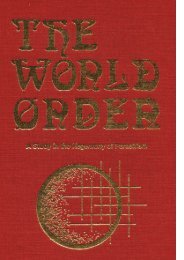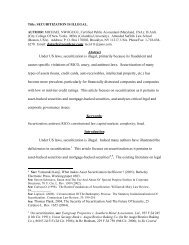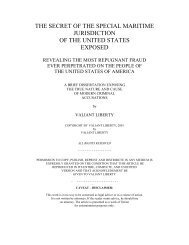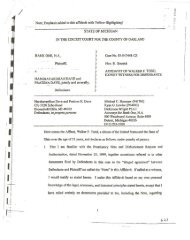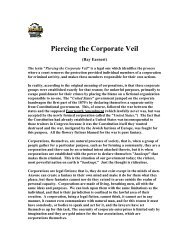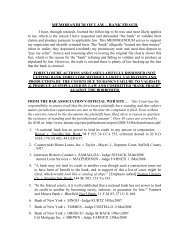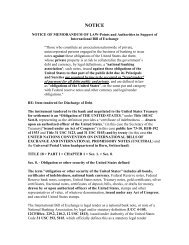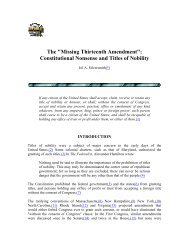W e b s t e r a n d t h e T e r m " J e w " - USA The Republic
W e b s t e r a n d t h e T e r m " J e w " - USA The Republic
W e b s t e r a n d t h e T e r m " J e w " - USA The Republic
Create successful ePaper yourself
Turn your PDF publications into a flip-book with our unique Google optimized e-Paper software.
W e b s t e r a n d t h e T e r m " J e w "<br />
By: William Norwood Hollis, M.A<br />
One of the tactics used in debate is to get the opponent off the major premise and onto a minor<br />
premise -- thus defeating him. One must use the proper denominator in order to solve any<br />
mathematical problem. <strong>The</strong> navigator, when his compass fails, turns to the North Star. Pope Leo XIII<br />
said "when a civilization is perishing, it would behoove those who would restore it to recall the<br />
principles from whence it sprang." Such wonderful advice! It is applicable to all areas of our lives<br />
today. Our schools are failing. If you will look to the beginning of the schools in our country, you<br />
will learn that they were Christian. <strong>The</strong>y were proud of it and not ashamed. It may surprise you to<br />
know that Harvard, Princeton, Yale, Syracuse, and countless others were originally the products of<br />
Christian money, philosophy, and the ethic, hard work. <strong>The</strong>ir curricula evidenced this fact. <strong>The</strong> same<br />
applies to our public schools where early history books, often began with Adam and Eve.<br />
Even our Young Men's Christian Association and Young Women's Christian Association over a<br />
period of time became the Y.M.C.A and the Y.W.C.A. <strong>The</strong>n, finally, they became simply, the "Y".<br />
Now, nothing is Christian about them at all.<br />
<strong>The</strong> same applies to our government. Just go back to when it started and you will see that we<br />
realized the maximum amount of freedom. This freedom lasted until 1932 when Charles A.<br />
Lindberg's baby was kidnapped and the Federal Kidnapping Law was enacted. Prior to this time, the<br />
Federal Government could not lay its hand upon an American citizen except for the defense of our<br />
country. Now look at how our lives have become regimented, our privacy invaded. And this has all<br />
happened within the lifetime of many of us.<br />
Our churches have not been immune to this attenuation of our liberties! By studying the history of<br />
the Church in the first century, you will find that all alms given were for "widows and orphans", either<br />
for the local "brethren", or for those "brethren" who were in need in another village. This practice<br />
continued for the next three-hundred (300) years. Now our government is taking care of the "widows<br />
and orphans", and our collections are going for bureaucratic church salaries, and opulence in both<br />
buildings and trappings. <strong>The</strong> foregoing points out how these things, over a period of time, ceased to<br />
be, or do, what they originally set out to be, or do. Time seems to have a corrupting influence, and<br />
especially so with organizations and with words.<br />
<strong>The</strong> evolution of many words has met with the same fate. For example, when I was a young lad<br />
back on the farm in Mississippi, my dear mother used to play and sing a song entitled, "Little<br />
Rosewood Casket". Not having learned the words until recent years, I envisioned a person lying in a<br />
coffin; therefore the song, to me, was very sad. <strong>The</strong>n in recent years I obtained the words to the song.<br />
<strong>The</strong> lyrics to the first verse are as follows:<br />
"<strong>The</strong>re's a little rosewood casket,<br />
Resting on a marble stand.<br />
<strong>The</strong>re's a package of love letters<br />
Written by my true love's hand . . ."<br />
Only then did I learn that the "casket" in the song was a small box often made of precious wood, and
Webster and the term "Jew"<br />
placed in a conspicuous place in a person's home. It contained valuables and memorabilia, such as the<br />
love letters. <strong>The</strong>re was no similarity between the words "casket" and "coffin" then, as there is<br />
presently. When this love song was written, the word "casket" denoted a treasure chest; but, as you<br />
know, the word is now synonymous with a funeral bier.<br />
So it is with many of the words which we use today! This, of course, includes some key Biblical<br />
words -- such as "Israel", "Jew", and "Hebrew"! It is absolutely necessary that we get a complete<br />
understanding of their origin, and meaning at the time of their origin, before much of the Bible will<br />
make sense to us. One such scripture is found in the book of Revelation 3:9, where Jesus Christ<br />
states:<br />
Behold, I will make them of the (S)ynagogue 1 of Satan, which say they are Jews, and are not, but do<br />
lie; behold, I will make them to come and worship before thy feet, and to know that I have loved thee.<br />
(Revelation 3:9)<br />
I submit that this verse is completely void of meaning and purpose if we subscribe to the organized<br />
church's teaching that the "Jew" is the Hebrew, the "Chosen" of GOD! Have you read anywhere in the<br />
Bible that anyone claimed to be a Jew, and was found not to be one Absolutely not! Rather we read<br />
in I John 5:10:<br />
He that believeth on the Son of God hath the witness in himself: he that believeth not GOD<br />
(JEHOVAH) hath made him a liar; because he believeth not the record that GOD gave of his Son.<br />
(1 John 5:10)<br />
And who are those who do not believe in JEHOVAH-GOD<br />
Whosoever transgresseth, and abideth not in the doctrine of Christ, hath not GOD. He that abideth in<br />
the doctrine of Christ, he hath both the Father and the Son. (2 John 1:9)<br />
If we can believe what the Bible says, we now know that if you have the Son, you have the Father<br />
(JEHOVAH-GOD). And further, that if you don't believe in JEHOVAH-GOD, the Father, you are a liar!<br />
Now where in all the Bible is there a record of anyone being a liar <strong>The</strong> Jews did not believe in GOD,<br />
and therefore were LIARS!<br />
However, if we place the proper translation of the word "Jew" in this scripture, it would read:<br />
Behold, I will make them of the (S)ynagogue 1 of Satan, which say they are Israel, and are not, but<br />
do lie . . .<br />
We know that there are those who did this, because we find in Romans 9:6:<br />
1 <strong>The</strong> Bible has a lower case "s"; but the word seems to be incorporated into a proper name, and thus should read,<br />
"Synagogue of Satan".<br />
Published by: First Century Christian Ministries at http://www.angloisrael.com<br />
2
Webster and the term "Jew"<br />
Not as though the word of God hath taken none effect. For they [are] not all Israel, which are of<br />
Israel: (Romans 9:6)<br />
You see, Israel is the chosen seed of GOD -- a race -- people -- a servant people. It is easy for us to<br />
understand why someone would like to consider himself a member of GOD's "Chosen race"; but no<br />
one wants to be branded as "liars"' and "antichrist". We can understand why one would prefer to be a<br />
legal blood heir rather than an "adopted" one; and may, therefore, claim to be a "son" when he was<br />
not. This makes sense, and nothing else does. Also, Jesus Christ, being GOD "incarnate" and who<br />
knew us from the "foundations of the earth"' certainly knew who were Israelites, and who were not.<br />
<strong>The</strong>refore, when he told the "Jews" that they were "not Abraham's children" (John 8:39), and "not of<br />
GOD" (John 8:47), He certainly knew what He was talking about!<br />
Perhaps now, we are ready to explore the fascinating trail of the evolution of the term, Jew. We<br />
intend giving you a most comprehensive study of this word. After reading and studying it, we feel<br />
that you will cease to look upon most of the "Jews" among us as GOD's "Chosen" race. To do this, we<br />
will take you back in time to the very first appearance of this word in the Bible. It is found in II Kings<br />
16:6.<br />
At that time Rezin king of Syria recovered Elath to Syria, and drave the Jews from Elath: and the<br />
Syrians came to Elath, and dwelt there unto this day. (II Kings 16:6)<br />
In this scripture text, we find the Kingdom of Israel, joined with the King of Syria, marching to<br />
Judea to "fight the Jews". This was written about the year 742 B.C. This is a very significant<br />
scripture as it definitely shows that the Israelites (Hebrews-Children of Israel) were not called Jews<br />
since they were "going up to Jerusalem" to fight the "Jews". You see, the Twelve Tribes of Israel (the<br />
Chosen) had split into two distinct kingdoms. Ten tribes formed the Kingdom of Israel, and the<br />
remaining two tribes (Judah and Benjamin) formed the Kingdom of Judah. It should be noted here,<br />
that throughout the Bible, the Kingdom of Israel was never -- never -- never called "Jews". In the<br />
scripture noted above, it is the Kingdom of Israel allying itself with Syria in the joint military action<br />
against "the Jews".<br />
At the time, (circa 742 B.C.) the term "Jew" was derived from the Hebrew word, "Yehudah", Judah,<br />
son of Jacob (Israel). <strong>The</strong> term was purely racial when it was first given at this time in history. Thus<br />
a "Jew" at this time, and perhaps for the next two centuries, would be of the "Chosen" race of GOD.<br />
However, the term plays no significant part in Biblical history until after the return of some forty-three<br />
thousand captives from Babylon, circa 536 B.C. Only this small portion of the approximately one and<br />
one-half million of the tribes of Judah and Benjamin (the Chosen), who had been taken captive some<br />
three generations previously, came back to the land of Judea that had been repopulated by non-<br />
Hebrew, pagan people in their absence. <strong>The</strong> northern portion (the old Kingdom of Israel of the Ten<br />
Tribes still in captivity) of the "Promised Land", had also been repopulated by various tribes of non-<br />
Hebrew people, themselves captives of the Assyrians. Even so, there was still a large segment of<br />
Israelites (Hebrews) who were left scattered throughout that portion of the land. <strong>The</strong> result of all of<br />
this was that when this small contingent of Judahites returned to the City of Jerusalem, there were few<br />
Published by: First Century Christian Ministries at http://www.angloisrael.com<br />
3
Webster and the term "Jew"<br />
true Israelites in the entire land. <strong>The</strong> majority of these were congregated in the area of Galilee, a<br />
north-eastern portion of the former Kingdom of Israel.<br />
We can see from this background of Biblical information that from the time of Abraham, the father<br />
of the "Chosen Race", some 2000 years B.C. down to 742 B.C.; the term "Jew" was never used in the<br />
Bible. <strong>The</strong>n, after its appearance in this one instance where Israel was "fighting the Jews", it was not<br />
used again until the "Babylonian Captivity", which comprised only the two of the twelve tribes of<br />
Hebrews. <strong>The</strong> term "Jew" was then given to the less than 44,000 returnees, who returned only to the<br />
city of Jerusalem to rebuild the Temple and the walls of the city. Later, the term designated anyone<br />
who lived in the city of Jerusalem, and by the advent of Jesus Christ, the term "Jew" meant anyone<br />
who lived in the country of Judea. Anyone who lives in Texas is a Texan. You will recall that Jesus<br />
Christ and eleven of the Apostles (excepting Judas Iscariot) all lived in Galilee, and were therefore,<br />
called "Galileans". <strong>The</strong>y were never called "Jews" in the Bible!<br />
It is also significant that not only the term "Jew" came back with the Jews from their captivity in<br />
Babylon, but also the Synagogue! By the time Jesus Christ first set foot in a Synagogue, Judaism,<br />
"the religion of the Jews", had already taken root and was well advanced. After Jesus' death and<br />
resurrection, Jerusalem was never the same, and was plagued with riots and civil commotions. Finally<br />
Rome became intolerant of these uprisings, and the Roman general, Titus, came with his army,<br />
leveled both the city and the temple to the ground, and "scattered the Jews". From this time on, the<br />
term "Jew" was given to anyone who embraced Judaism, "the religion of the Jews". This evolution of<br />
the term "Jew" from one of race -- to one of political (geographical) boundaries -- to one of a religious<br />
adherent, will be born out in subsequent quotations from various reference books. 2<br />
WEBSTER'S NEW INTERNATIONAL DICTIONARY<br />
Published 1923<br />
"Jew: 277 Ju-Joo n. (ME, k Jew, Jeu, Giu, of Jueu, Juieu, Gieu, F. Juif, L. Judaeus,<br />
Gr. Iovoaios, Fr. Iouoa a the country of the Jews, Judea, fr. Hebrew-Yehudah Judah,<br />
son of Jacob. Cf. Judiac)<br />
2 In my research for this work, I have purchased many old dictionaries, encyclopedias, and history books, which<br />
include information on this subject. Others I have copied, and have these also in my files. For our purpose here, we<br />
will simply use a representative sampling of them which extend over a period of time, but should be adequate to<br />
prove how the meaning of the term "Jew" has changed over the years.<br />
Published by: First Century Christian Ministries at http://www.angloisrael.com<br />
4
Webster and the term "Jew"<br />
"Orig. 3 one belonging to the tribe or the kingdom of Judah; after the return from the<br />
Babylonish captivity, any member of the Hebrew state; hence any member of the<br />
Hebrew race of people, or anyone whose religion is Judaism 4 <strong>The</strong> Jews of today do<br />
not uniformly reveal a pure Semitic type, but show evidences of intermixture in the<br />
various countries where they dwell. As a rule they are shorter than the native<br />
populations and especially in northern Europe, more brunette. <strong>The</strong>y are<br />
characteristically distinguished mainly by their features, especially by the turn of the<br />
nostrils, and a peculiar cast of the eyes and eyebrows.<br />
"<strong>The</strong> Jews are not a race, but only a people, after all. In their faces we read its<br />
confirmation; while in respect of their other traits we are convinced that such<br />
individuality as they possess, by no means inconsiderable--is of their own making<br />
from one generation to the next, rather than a product of unprecedented purity of<br />
physical descent. W. Z. Ripley"<br />
As you can see, this is a rather lengthy description of the term "Jew", and you will notice that<br />
much of what is said here (which covers the entire spectrum) will diminish in subsequent accounts.<br />
This account gives the following:<br />
1. Originally a member of the tribe of Judah;<br />
2. Member of the Kingdom of Judah;<br />
3. Any member of the Hebrew race, or people;<br />
4. Anyone whose religion is Judaism.<br />
In addition to these definitions, it tells us the following about this people:<br />
1. <strong>The</strong> "Jews" show evidence of intermixture, (race-mixing) with the people in the<br />
countries with whom they dwell.<br />
2. Physically, they are shorter, dark headed, with distinctive eyebrows, eyes, and<br />
nostrils.<br />
3. <strong>The</strong>y are not a race!<br />
Incidentally, this is about all that we intend saying about the subject in this work. We simply want<br />
to show that preachers and Sunday school teachers who teach that Abraham and Moses, etc., are<br />
Jews, when the Bible calls them Hebrews, are not intellectually honest. You can see that the term<br />
"Jew" was first (originally) given to members of the tribe of Judah. Well, Judah was Abraham's<br />
grandson, and thus it was impossible for Abraham to have been born a member of his grandson's<br />
tribe. Likewise, Moses was not a Jew from the tribe of Judah, and he never set foot in the "Promised<br />
Land"; therefore, he cannot possibly be called a "Jew" -- and the Bible never called him one<br />
either.<br />
3 Originally.<br />
4 Underlining in this chapter and book is the Author's for inference and attention.<br />
Published by: First Century Christian Ministries at http://www.angloisrael.com<br />
5
Webster and the term "Jew"<br />
THE MODERN ENCYCLOPEDIA:<br />
(A DICTIONARY OF UNIVERSAL KNOWLEDGE)<br />
By Sir J. A. Hammerton . . . London (circa 1925)<br />
"JEW: Men of Judah, or of Judea. In the Bible itself (Esther 2,5) Jew signified an<br />
adherent of Judaism. <strong>The</strong>se two connotations of Jew -- the one racial, and the other<br />
religious -- have persisted into modern times."<br />
This account gives basically the same definition as the one above, and in the proper order. One<br />
racial, then by citizenship, then by religion. However, this account is very significant in that it tells<br />
us the Bible itself, in the book of Esther, records people other than Hebrews or members of the tribe<br />
of Judah, who became "Jews" by converting to Judaism, "the religion of the Jews". <strong>The</strong> Book of<br />
Esther was written in 521 B.C. after the Babylonian captivity. It covered events which transpired<br />
during the time that the tribes of Judah and Benjamin were under the rule of Ahasuerus, the King of<br />
Persia. This is also the era mentioned above, that saw the greatest promulgation of the term "Jew",<br />
and it was these Persians who embraced Judaism "for fear of the Jews", as recorded in the book of<br />
Esther.<br />
HOLY BIBLE: KJV<br />
(THE LIGHT OF THE WORLD EDITION)<br />
1954<br />
In the back of the Bible is found a section called the "condensed Bible Commentary".<br />
In it, we find the following:<br />
"What is the origin of the name, 'Jew'"<br />
ANSWER: <strong>The</strong> appellation "Jew" is derived from the patriarch Judah, and was<br />
originally applied to all members of that tribe and also subjects of the separate<br />
Kingdom of Judah, in contradistinction to the seceding ten tribes, who retained the<br />
name of Israelites. During the captivity and ever since, the term "jew" seems to have<br />
applied indiscriminately to the whole race."<br />
This definition confirms the one previously stated, that the term "Jew" related to a person who<br />
lived in Judah; but it also revealed that it was a distinction of the Tribe of Judah from the other<br />
tribes, who were called ISRAELITES. It also stated that the term has now been "applied indiscriminately<br />
to the whole race". This is absolutely correct; and it is this reason that this work exists.<br />
YOUNG'S ANALYTICAL CONCORDANCE TO THE BIBLE<br />
1970<br />
"JEWS: A descendant of Judah, in later times also an Israelite. Strictly speaking,<br />
Published by: First Century Christian Ministries at http://www.angloisrael.com<br />
6
Webster and the term "Jew"<br />
the name is appropriate only to the subjects of the kingdom of the two tribes, (Judah<br />
and Benjamin) after the separation of the ten tribes, B.C. 975."<br />
We have underlined "in later times . . ." It does not mean Biblical times, as Israelites were never<br />
Jews in the Bible, nor called such. This is a much later practice of applying the term "Israelite" to<br />
anyone who embraces Judaism, and is called a "Jew". Shortly, you will see from their own<br />
reference books how this came about. We see that in this reference book the term "Jew" means:<br />
1. A descendant of Judah. (All others confirm this.)<br />
2. Subjects of the kingdom of the two tribes, Judah and Benjamin.<br />
3. In later times, also an Israelite.<br />
4. <strong>The</strong> term "Jew" is used to separate Jews from Israelites!<br />
Number 2 above, states that the term "Jew" was applied to all subjects of the Kingdom of Judah.<br />
This, of course, means residents. People who lived within the confines of that kingdom, or state. It<br />
was later called Judea at the time of Christ.<br />
THE AMERICAN HERITAGE DICTIONARY OF THE ENGLISH LANGUAGE<br />
HOUGHTON MIFFLIN CO. BOSTON, 1971<br />
"JEW: 1. An adherent of Judaism.<br />
2. A descendant of the Hebrew people. adj. Jewish-considered offensive.<br />
Jew down. <strong>The</strong> best in bargaining by haggling of shrewd practices.<br />
An offensive expression, used derogatorily. (Middle English GIW,<br />
JU... from Old French: GIU, JUIU, from latin Judaeus 5 from Greek<br />
IOUDAIUS, from Aramaic YEHUDAY, and Hebrew, YEHUDI...after<br />
the Tribe of Yahudah, Judah.)"<br />
This reference to the term "Jew" is highly significant in that we now find the formerly preferred<br />
Number 3 definition has moved into the Number 1 position, making the original, and true definition<br />
of the term the least preferred -- or used! It also shows that in spite of all efforts to eliminate it for<br />
the past two hundred years, (more about this later) the term still carries a derogatory connotation.<br />
However, in this same year, we find Webster's still clinging to what we have shown previously as<br />
the historic meaning of the term "Jew".<br />
WEBSTER'S NEW INTERNATIONAL DICTIONARY<br />
Published by G. & C. Merriam Co., 1971<br />
"JEW: Yehudah-Judah, Jewish kingdom Southern Palestine after Yehudah Judah,<br />
4th son of Jacob an ancestor of the Judahites.<br />
5 Smith's Bible Dictionary states that the English word "Jew" was from the Latin Judaeus, which simply means a<br />
resident of Judea.<br />
Published by: First Century Christian Ministries at http://www.angloisrael.com<br />
7
Webster and the term "Jew"<br />
1. a.) Judahite,<br />
b.) Israelite.<br />
2. A member of the nation existing in Palestine from the 6th century B.C. to<br />
the 1st century A.D., within which the elements of Judaism largely<br />
developed.<br />
3. A person belonging to the world-wide group constituting a continuation<br />
through descent, or conversion of the Jewish people, and characterized by<br />
a sense of community: one whose religion is Judaism, see: Ashkenazi-<br />
Sephardi.<br />
4. A person believed to drive a hard bargain.<br />
"ASHKENAZI: A member of one of the two great divisions of Jews comprising the<br />
eastern European Yiddish-speaking Jews -- compare Sephardi.<br />
"SEPHARDI: Region, probably in northern Asia Minor where Jews were once held<br />
in captivity. A member of the occidental 6 branch of European Jews early settling in<br />
Spain."<br />
Other than the traditional definitions of the term "Jew", two new elements are introduced. Of the<br />
definitions of the term "Jew" above, number two is perhaps the most important evolution of the term<br />
thus far. This definition tells us that the term no longer has a racial connotation; but has taken on a<br />
geographical (political) meaning. It states that a Jew is any "member of the nation (Judea) existing<br />
in Palestine from the 6th century B.C. to the 1st century A.D.". This, of course, verifies what we<br />
have previously told you, and that is the term "Jew" principally came into usage after the Babylonian<br />
Captivity -- 585 B.C. We further stated that it was from this period of time, down to the time that<br />
Jesus Christ walked the streets of Jerusalem, that the term "Jew" evolved into nothing more than the<br />
designation of a person who lived in the country of Judea. We know this because the Bible tells us<br />
so. Because we know also that the people who lived in Galilee were called "Galileans", the people<br />
who lived in Moab were called "Moabites", and the people who lived in Egypt were called<br />
"Egyptians".<br />
Secondly, terms are given for a division of world Jewry. <strong>The</strong>se are two distinct groups of people.<br />
<strong>The</strong> term "Jew" no longer applies only to:<br />
a.)<br />
b.)<br />
c.)<br />
d.)<br />
e.)<br />
f.)<br />
a member of the tribe of Judah,<br />
members of the tribes of Judah and Benjamin,<br />
a resident of the kingdom of Judah (Judea),<br />
any person descended from the Hebrews,<br />
any person thought to have descended from the Hebrews,<br />
any adherent to the religion of Judaism; but now we find that there are<br />
6 Webster's New World Dictionary - 1968 College Edition.<br />
"OCCIDENTAL: 1. western, 2. of the Occident, its people, or their culture-Western, a native of the Occident, or a<br />
member of a people native to that region."<br />
Published by: First Century Christian Ministries at http://www.angloisrael.com<br />
8
Webster and the term "Jew"<br />
two distinct groups of this already hodge-podge of people.<br />
For the racial characteristics of these two divisions of Jewry, their complete historical background,<br />
see <strong>The</strong> Thirteenth Tribe, published by Random House in 1976, and written by Arthur Koestler, a<br />
highly acclaimed European Jewish author. <strong>The</strong> book proves without question, that the Ashkenazi<br />
Jews, which comprise all but some 500,000 Jews worldwide, cannot trace their ancestry earlier than<br />
the 7th century, and absolutely not to any of the twelve tribes of Israel. (Hence the title, <strong>The</strong><br />
Thirteenth Tribe.)<br />
WEBSTER'S NEW COLLEGIATE DICTIONARY<br />
Copyright, 1973<br />
"JEW: Heb-Yehudhi, Yehudah-Judah, Jewish kingdom.<br />
1. a. A Member of the tribe of Judah.<br />
b. Israelite.<br />
2. A member of a nation existing in Palestine from 6th century B.C. to 1st<br />
century A. D.<br />
3. A person belonging to a continuation through descent or conversion, of the<br />
ancient Jewish people.<br />
4. One whose religion is Jewish."<br />
Now we are beginning to see even more confusion being added to the already completely<br />
meaningless term "Jew". Whereas previously, one of the definitions given was "a person descended,<br />
or was thought to have descended, from the Hebrews" (Israelites); we now see that it is merely a<br />
person who "descended from the ancient Jewish people." Or, more confusing still, "one whose<br />
religion is Jewish". Not Judaism -- but simply Jewish!<br />
BICENTENNIAL KJV HOLY BIBLE<br />
Regency House, 1976<br />
"JEW: <strong>The</strong> Bible provides definitions: 1. <strong>The</strong> members of the State of Judah. Neh<br />
1:1-2, Jer 32:12, 40:11.<br />
"<strong>The</strong> term is now highly fluid. It covers religion and birth, religion only, or birth<br />
only."<br />
We can see from the above definition of the term "Jew" that by 1976 it means whatever you desire<br />
it to mean. This is fine except it can't be equated with the terms "Israel" or "Hebrew" since they are<br />
racial terms for the twelve tribes of Jacob (Israel). "Highly fluid", then, is very appropriate for the<br />
term "Jew", and as you will learn later from their own sources, the Jews like it this way!<br />
THE UNIVERSAL STANDARD ENCYCLOPEDIA<br />
Printed <strong>USA</strong>, 1955<br />
"JEWS: <strong>The</strong> word itself stems from the Hebrew Yehudi, originally meaning a<br />
Published by: First Century Christian Ministries at http://www.angloisrael.com<br />
9
Webster and the term "Jew"<br />
member of the Hebrew tribe of Judah and later, as Judea, applied to the Jewish<br />
state: the English word "Jew" is derived directly from the Latin Judaeus, meaning<br />
an inhabitant of Judea. Modern Jews are members of a separate ethnic community<br />
or fellowship rather than of a race . . ."<br />
This reference is of signal importance. In addition to showing us that the term "Jew" was<br />
originally racial (member of the tribe of Judah) it states that the word "Jew" is an English translation<br />
of the Latin word "Judaeus", which means an inhabitant (resident) of Judea. THEREFORE, EACH<br />
TIME YOU READ THE WORD "JEW" IN THE NEW TESTAMENT, IT SIMPLY MEANS A<br />
PERSON WHO LIVED IN THE COUNTRY OF JUDEA -- THE SOUTHERN PORTION OF<br />
PALESTINE. This is all that the term "Jew" means -- A JUDEAN. Tell me now, how did this<br />
English word "Jew" come to mean Hebrew <strong>The</strong> Children of Israel <strong>The</strong> Chosen More about this<br />
later, however, you may find it of interest at this point to know that a Jewish reference book from<br />
which I will later quote, states that the term "Jew" did not come into existence until the year 1000<br />
A.D. I have yet another reference that says the term "Jew" was not in existence at the time of the<br />
original King James Translation of the Holy Scriptures, and was not used in that edition. At present,<br />
I am trying to find and purchase one of these Bibles. (I have since purchased a commemorative<br />
edition of the 1611 A.D. K.J.V. Bible.)<br />
SMITH'S BIBLE DICTIONARY<br />
By: William Smith, LL.D.<br />
Fleming H. Revell Company, Pub.1970<br />
"JEW: <strong>The</strong> name was properly given to a member of the Kingdom of Judah, after<br />
the separation of the Ten Tribes. <strong>The</strong> term first makes its appearance just before the<br />
captivity of the Ten Tribes, (II Kings 16:6). After the return (Babylonian Captivity)<br />
the word received a larger application. Partly from the predominance of the<br />
members of the old Kingdom of Judah among those who returned to Palestine, partly<br />
from the identification of Judah with the religious ideas and hopes of the people. All<br />
the members of the new state were called "Jews". (Judeans) and the name was<br />
extended<br />
to the remnant of the race scattered throughout the nations. (Dan 3:8, 12; Ezra<br />
4:12, 23, etc...) Under the name of "Judeans", the people of Israel were known to<br />
classical writers (Tac. H.v.2, etc.) <strong>The</strong> force of the title "Jew" is seen particularly in<br />
the gospel of St. John, who very rarely uses any other term to describe the opponents<br />
of our LORD. <strong>The</strong> name indeed, at the close of the apostle's life, came to be the true<br />
antithesis of Christianity, as describing the limited and definite form of a national<br />
religion; but an earlier stage of progress of the faith, it was contrasted with Greek as<br />
implying an outward covenant with GOD (Rom. 1:16; 2:9-10; Col 3:11, etc.) which<br />
was correlative of Hellenist (HELLENISTS), and marked a division of language<br />
subsisting within the entire body, and at the same time less expressive than Israelite,<br />
which brought with special clearness the privileges and hopes of the children of<br />
Jacob. (II Cor 11:22; John 1:47; etc.)"<br />
Published by: First Century Christian Ministries at http://www.angloisrael.com<br />
10
Webster and the term "Jew"<br />
Whereas, this definition is somewhat lengthy, it is very informative as to the true meaning of the<br />
term "Jew". <strong>The</strong> first sentence states that it was "properly given to a member of the Kingdom of<br />
Judea". This confirms the statement given above in the Universal Standard Encyclopedia, that the<br />
"English word 'Jew' is from the Latin Judaeus, meaning an INHABITANT OF JUDEA". This is all<br />
that the term "Jew" meant at the time of Jesus Christ and when the subsequent New Testament was<br />
written. It also states that the term "Jew" came into existence after the "separation of the Ten<br />
Tribes". It is used first in II Kings 16:6 shortly before the captivity of the Ten Tribes. As you can<br />
see, it was never given to the Ten Tribes of Israelites. It was given to "all members of the new state"<br />
(Kingdom of Judah-Judea). We see, too, that the term "Jew" as an antonym for the term<br />
"Christianity", and the Apostle John used it almost entirely to designate the enemies of Christ. It<br />
says too, that the majority of those returning from Babylon were of the tribe of JUDAH. <strong>The</strong> Ten<br />
Tribes, which were taken into Assyrian Captivity and never returned to the Promised Land, never<br />
were called Jews because, as we see above, the name was first used for the tribe of Judah shortly<br />
before the Ten Tribes were taken captive. <strong>The</strong> Ten Tribes are always referred to in the Bible as the<br />
"Children of Israel", the "Israelites", "Jacob's Children", "Hebrews", or the "Ten Lost Tribes of<br />
Israel"; but again, never are they called "Jews".<br />
DICTIONARY OF THE BIBLE<br />
By: John L. McKenzie,<br />
Society of Joseph<br />
McMillian Press, 1965<br />
"JEW: A resident of Judea - - <strong>The</strong> term Jew, used by the Apostle Paul to designate<br />
Christians who were Jews by birth -- Galatians 2:13-15."<br />
Folks, now we add an entirely new ingredient to the term "Jew", <strong>The</strong> Apostle Paul, who is<br />
credited with writing most of the New Testament, used the term "Jew" when referring to Christians<br />
who were "Jews" by birth. Please note that if they were "Jew by birth" they were undoubtedly<br />
Hebrews from the tribe of Judah or Benjamin. <strong>The</strong> Hebrews were given "ears to hear", and the<br />
proselyted "Jews" were not. THEY DID NOT BELIEVE IN CHRIST THEN, NOR DO THEY<br />
BELIEVE IN HIM NOW. THEY WERE, THEN AND NOW, ACCORDING TO THE BIBLE,<br />
THE "ENEMIES OF CHRIST". (See chapter by this title.) <strong>The</strong>refore, we learn that many of the<br />
people referred to as "Jews", especially in Paul's writings, were Christians. Now, however, since the<br />
term "Jew" carries a religious meaning almost entirely, when a "Jew" is converted to Christianity he<br />
is no longer a Jew. He is simply a Christian! It would be wrong to refer to him as a Christian<br />
Hebrew, or a Hebrew Christian since we certainly have shown by now that the term "Jew" is<br />
practically meaningless.<br />
SECULAR AND BIBLICAL DEFINITIONS OF THE TERM, "JEW"<br />
We are recapping, for your perusal, the definitions given thus far of the term "Jew". We are certain<br />
that you may be, as most are, as confused as we are as to the exact meaning of the word. And that<br />
hereinafter you must wonder how a preacher can continue to make statements such as, "<strong>The</strong> Jews<br />
did this" or "the Jews did that", without wondering just who he is taking about! Were they early<br />
Published by: First Century Christian Ministries at http://www.angloisrael.com<br />
11
Webster and the term "Jew"<br />
Christians Were they members of the Tribe of Judah Were they simply residents of Judah<br />
(Judea) Were they converted Moabites or converted Roman soldiers Ask him whom he is<br />
referring to. If he states that he is referring to the Hebrews -- the Chosen; then ask him how he can<br />
make this statement when the term "Jew" used in the Bible is an English word translated from the<br />
Latin word "Judaeus", which meant residents of Judea.<br />
We have learned thus far the following definitions of the term, "Jew":<br />
1. Used as Christians who were "Jews" by birth, but converted;<br />
2. A member of the tribe of Judah;<br />
3. A descendant of the Hebrew people;<br />
4. A member of either the tribe of Judah, or the tribe of Benjamin;<br />
5. An adherent to the religion of Judaism;<br />
6. Anyone living in Judea;<br />
7. Anyone regarded to have descended from the "Ancient Hebrews";<br />
8. An inhabitant of the State of Judah;<br />
9. A convert to Judaism;<br />
10. A person who is an extortionate usurer;<br />
11. A driver of hard bargains;<br />
12. One whose religion is "Jewish";<br />
13. A person belonging to a continuation, through descent or conversion, of the ancient<br />
Jewish people.<br />
Yes, I would say that the term "Jew" is rather fluid, wouldn't you However, this is not the<br />
complete story. We have seen what the various reference books have given as a definition of the<br />
term "Jew", and we certainly all know the "religious establishment" considers them to be the ancient<br />
Hebrews, the Children of Israel, the Chosen race of GOD, chosen from the "foundations of the earth"<br />
to be "GOD's glory", His witnesses to the other nations (people) for all times. It is appropriate at this<br />
time to consider what the Jews think about themselves. In other words, what do they consider a<br />
"Jew" to be In so doing, we will find that there are several definitions to be added to the already<br />
confusing list above!<br />
In our downtown library, I found a set of THE ENCYCLOPEDIA JUDAICA or a history of the<br />
Jews.<br />
THE ENCYCLOPEDIA JUDAICA<br />
"JEW: (Hebrew-Yehudi)<br />
"Semantics. <strong>The</strong> word "Jew" passed into the English Language from the Greek<br />
(Ioudiaos) by way of the Latin 'Judaeus', and is found in early English (from about<br />
the year 1000) in a variety of forms: Iudea, Gyu, Giu, Iuu, Iuw. Iew which<br />
developed into "Jew", therefore, is ultimately traced to the Hebrew Yehudi, a term<br />
which originally applied to members of the tribe of Judah, the patriarch, Jacob. <strong>The</strong><br />
term was also used for those who dwelt in the area of the tribe of Judah and thus<br />
later during the seven years that David reigned in Hebron, his territory was called<br />
the Kingdom of Judah (II Sam 5:5). Later still, with the split of the kingdom during<br />
Published by: First Century Christian Ministries at http://www.angloisrael.com<br />
12
Webster and the term "Jew"<br />
the reign of Rehoboam, the Northern Kingdom was called Israel and the Southern<br />
was called Judah, although it also encompassed the territory of the tribe of Benjamin<br />
(I Kings 12:16-21). From that time on, the term "Yehudi" applied to all residents of<br />
the Southern Kingdom, irrespective of their tribal status. After the destruction of<br />
Israel (Ten Tribes into Assyrian Captivity) only Judah remained, and the term<br />
"Yehudi", or "Jew", then lost its specific connection with the Southern Kingdom.<br />
This is strikingly illustrated in Esther 2:5, 5:13, where Mordecai, although belonging<br />
to the tribe of Benjamin is called Yehudi. This term was also utilized at that time for<br />
the Jewish religion since it is related that after Haman's downfall, many from among<br />
the people of the land converted to Judaism (mityahadim, Esther 8:17). <strong>The</strong> term<br />
"Jew" connoted by this time a religious, political, and national entity, without<br />
differentiation between these categories. "Jew", however, was mainly used outside<br />
the land of Israel (not Israel -- Judea) by Jews and non-Jews and in languages other<br />
than Hebrew. Thus Nehemiah, who was an official at the Persian court, refers to<br />
"Jews" in his personal "diary", and the Book of Esther (see above) was almost<br />
certainly written by someone close to court circles. From the Persian and Aramaic<br />
the word passed into Greek and from there into Latin. However, while the name<br />
"Jew" became common usage outside the land of Israel, Judea<br />
7 the Hebrewspeaking<br />
Jews within the land were particular to call themselves "Israel" (Yisrael:<br />
"Israelites")."<br />
[It seems that this was a deliberate reaction parallel to the<br />
general intensification of ancient religious and literary values and<br />
aimed at strengthening the identification with the nation's early<br />
history. 8 ]<br />
"Thus Ezra, as opposed to Nehemiah, uses the name Israel throughout and even in<br />
the Aramaic letter given to him by the Persian king. From that period on, the name<br />
'Israel' is used in Hebrew (Jewish) literature: in the Hebrew (Jewish) books of the<br />
Apocrypha (Judith 9 Tobit, I Maccabees, etc.); in the Judean Desert Scrolls; in the<br />
Mishna and the Hebrew (Jewish) parts of the Talmud; and on the coins of the 70<br />
C.E. revolt and of that of Bar Kikhba ('the redemption of Israel'; 'the freedom of<br />
Israel'). Exceptions such as 'Prince of the Jews' on the copper column erected on<br />
Mt. Zion in honor of Simeon the Maccabee (I14:47, also 37 and 40) and 'Group of<br />
the 'Jews'' on the coins of his son Hohanan, are to be explained by the political<br />
designation, Judea, by which the gentile world knew the limited territory of the<br />
7<br />
Author's inclusions: Judea was never called Israel in the Bible. This is the writer taking license--by doing so, a<br />
"resident" of "Israel" becomes an Israelite.<br />
8<br />
Author's inclusions and emphasis. (This is in the quotation of the Encyclopedia Judaica).<br />
9<br />
<strong>The</strong>se are all non-Biblical, non-Hebrew, Jewish events of A.D. origin. Judea was never called Israel in the<br />
Bible.<br />
Published by: First Century Christian Ministries at http://www.angloisrael.com<br />
13
Webster and the term "Jew"<br />
Jewish State. When, indeed, that territory was enlarged the name 'Land of Israel’<br />
10 came once more into use. This difference in usage is strikingly illustrated in the<br />
Gospels: the Jews are recorded as having referred (mockingly) to Jesus as 'King of<br />
Israel', whereas the Roman, Pilate, and his soldiers refer to Him -- both verbally and<br />
in writing -- as 'King of the Jews' (Mark 15:32, 2, 9, 18, 26). For Christians, the<br />
word 'Judaeus' was conflated with the name of the villain of the gospel story, Judas<br />
Iscariot, who was considered the typical Jew. Judas was linked with the devil (Luke<br />
33:3), and the result was an evil triangle of the devil-Jew-Judas. This relationship<br />
helped to establish the pejorative meaning of the word 'Jew' in popular usage. <strong>The</strong><br />
noun could mean 'extortionate usurer, driver of hard bargains', to overreach.<br />
"Many attempts to root out these derogatory meanings by having the dictionary<br />
definitions revised have been made in the United States, England, and Europe; but<br />
have, however, met with little success, 11 since the problem is not one of ill-will on<br />
the part of the lexicographers, but rather of semantics and popular usage.<br />
"In order to avoid the unwelcome associations and connotations of the word, Jews<br />
began in the 19th century to call themselves HEBREWS AND ISRAELITES (e.tg.,<br />
Alliance Israelites Universelle, founded 1860). Nevertheless, these new names<br />
quickly took on the same pejorative associations as 'Jew', as scores of 19th century<br />
novels testify.<br />
"Recently there has been a gradual change in the usage of the word. <strong>The</strong> brutal<br />
murder of a great part of the Jewish people during the Holocaust 12 has limited<br />
subsequent degrading usage of the term. Since the conclusion of the war, anti-<br />
Semitism is under legal scrutiny in many countries, and this covers the use of 'Jew' in<br />
the pejorative sense, along with "Yid", "Sheeny", "Ikey" and the like. (Y.M.G./Ed.)"<br />
Folks, you need to study this definition of the term "Jew". In it, you will find all of the ingredients<br />
necessary to straighten your mind out on just who the Jews are. In so doing, you will come to the<br />
obvious conclusion that, based upon the above, the Jews cannot possibly be the Hebrews, the<br />
Children of Israel, the Chosen of the Bible. Of course, this definition includes all of the traditional<br />
definitions of the term "Jew" which have been previously given. By now you should be able to see<br />
that the term "Jew" was first given to members of the tribe of Yehudah (Judah). This, of course, is<br />
racial. Abraham, Isaac, and Jacob's seeds are racial. <strong>The</strong>y were Hebrews, the Children of Israel, the<br />
Chosen!<br />
10 This term not used in the Bible.<br />
11 This statement is incorrect. As we have seen in the evolution of the term "Jew", they have been very successful<br />
in substituting the words "Hebrew" and "Israel" for the term, "Jew".<br />
12 Many believe that this is why the "Holocaust" has been continually in the news for the past forty-five years.<br />
Published by: First Century Christian Ministries at http://www.angloisrael.com<br />
14
Webster and the term "Jew"<br />
<strong>The</strong>n we found that by the time of Jesus Christ, the term "Jew" was given to anyone living in the<br />
country of Judea (formerly the Kingdom of Judah). <strong>The</strong>n we learned that the term was given to<br />
anyone who embraced Judaism, the "religion of the Jews". This is the definition preferred by<br />
contemporary reference books, and the Jews themselves. This revelation alone, should convince<br />
most skeptics, or misinformed persons that a religion which embraces Menachem Begin, Elizabeth<br />
Taylor, and Sammy Davis Jr., cannot possibly be substituted for the Biblical term "Seed"<br />
(posterity). But this is not all.<br />
We also found that the English word, "Jew" is a translation of the Latin word, "Judaeus" which<br />
meant absolutely nothing but a resident of Judea. Not Isaac's sons, nor Jacob's sons (Israel), just<br />
simply residents of Judah (Judea).<br />
<strong>The</strong>re are two court cases in Israel, which further strengthens the religious definition of the term,<br />
"Jew".<br />
<strong>The</strong> following is found in Encyclopedia Judaica.<br />
"In 1968, a lieutenant commander in the Israeli Navy, Benjamin Shalit requested<br />
that his two children born of a non-Jewish mother be registered on their identity<br />
cards as Jews. When the Ministry of the Interior refused to accede to this request,<br />
Shalit petitioned the Supreme Court to order the Ministry to show cause why they<br />
should not so register the children. THE SUPREME COURT, SITTING FOR THE<br />
FIRST TIME IN ITS HISTORY IN A COMPLEMENT OF NINE JUDGES, . . .<br />
decided (on January 23, 1970; case No. H.C. 58/68) by a majority of five to four that<br />
the registrar had no right to question a statement made in good faith by the applicant<br />
but was duty bound to register what he was told . . . <strong>The</strong> decision raised a strong<br />
public protest and the law was subsequently changed to accept only those born of<br />
Jewish mothers or converted."<br />
Thus, within twenty-four hours after the decision in favor of Commander Shalit, the orthodox<br />
Jewish political party forced the court to rescind its decision and revert to the status quo (i.e. no<br />
definite decision on what constitutes a "Jew").<br />
Also in the Judaica, we find the following statement:<br />
". . . <strong>The</strong> Supreme Court (of Israel) in the case of Oswald Rufeisen, a born Jew who<br />
converted to Catholicism and joined the Carmelite order that although in the opinion<br />
of the court the appellant might be a Jew halakically, for the purpose of the Law of<br />
Return he could not be so considered . . ." <strong>The</strong> Halakic definition of a "Jew" is thus:<br />
"A child born of Jewish parents or a convert to Judaism are considered Jews . . ."<br />
However, "A child born of a non-Jewish mother must therefore undergo ritual<br />
conversion, (religious) even though his father is Jewish".<br />
In the book, Hebrew Christianity a chapter entitled "A Matter of Definitions", relates the<br />
Published by: First Century Christian Ministries at http://www.angloisrael.com<br />
15
following:<br />
Webster and the term "Jew"<br />
"As a consequence of the interest aroused by the Shalit case, a public opinion poll<br />
was held on the question. Fifteen hundred Jewish families were canvassed with the<br />
following results:<br />
"12% declared that a Jew is a person whose father or mother is Jewish or who has a<br />
Jewish spouse.<br />
"23% claimed that a Jew is a person who considers himself a Jew.<br />
"19% held that a man born to a Jewish mother or who converts to Judaism is a Jew.<br />
"13% said a Jew is one who lives in Israel or who identifies with the Jewish state.<br />
"13% stated that a Jew is one who observes the Jewish religious practices.<br />
"11% answered that a Jew is one who is raised and educated as a Jew.<br />
"9% said they could not define it.<br />
"<strong>The</strong>se results were recorded in the Jerusalem Post of November 25, 1968. More<br />
could be said and other examples could be given to show the confusion in the Jewish<br />
world over definitions. But these should suffice to show that there is no uniformity or<br />
objective standard for defining Jewishness; virtually all definitions are subjective."<br />
To this we will say Amen and Amen!<br />
Folks, we have now seen a comprehensive view of the evolution of the term "Jew", which has<br />
been recorded in reputable sources. Some say that the word is English and that it was not in<br />
existence prior to the tenth century A.D., others state the seventeenth century! We do know,<br />
however, that it did not appear in the original King James Bible. We know, according to these<br />
reputable sources, that it is a translation of the Latin word "Judaeus" which meant "an inhabitant of<br />
the country of Judea". We know, too, that an "inhabitant" can be white, black, brown, yellow, or<br />
red. <strong>The</strong>refore, it has absolutely no racial significance at all! We learned that many of these<br />
"inhabitants" of Judea embraced Judaism, the "religion of the Jews", and that after the Dispora<br />
(dispersion of the Jews) the term, "Jew" was broadened to include "anyone whose religion was<br />
Judaism". From the above-mentioned Supreme Court cases in Israel, we know that the religious<br />
definition is still upheld as it has been for the past 2000 years.. That is why any person, regardless of<br />
race, who is converted to Judaism, is considered a "Jew". It is this ambiguousness, which was<br />
brought about by the departure from the Biblical teaching of the "Chosen" race that has caused a<br />
dilemma even in the minds of the Jewish people themselves.<br />
As reliable as reference books are, however, they cannot speak for JEHOVAH-GOD. GOD's word,<br />
Published by: First Century Christian Ministries at http://www.angloisrael.com<br />
16
Webster and the term "Jew"<br />
the Holy Bible, speaks for Him. Did He, then, pick an "everlasting seed", or an everlasting religion<br />
for His glory here on earth Here is His answer:<br />
1 Yet now hear, O Jacob my [GOD] servant; and Israel, whom I have chosen: 2 Thus saith the LORD<br />
that made thee, and formed thee from the womb, . . . 3 I will pour my spirit upon thy seed, and my<br />
blessing upon thine offspring: (Isaiah 44)<br />
After Jacob's sons (Jacobson) produced the Twelve Tribes of Israel, who subsequently went down<br />
to Egypt, stayed there over four centuries, came out of captivity to wander in the Wilderness, finally<br />
took the "Promised Land" and then were ruled by the Judges and three kings; we find King Solomon<br />
talking to the LORD in a prayer:<br />
And thy servant [is] in the midst of thy people which thou hast chosen, a great people, that cannot be<br />
numbered nor counted for multitude. (1 Kings 3:8)<br />
<strong>The</strong> Chosen, were of Jacob's seed who "were formed in the womb" by JEHOVAH-GOD. <strong>The</strong>y were<br />
the "Elect", and the select! This seed, according to JEHOVAH-GOD, would be "His people, and He<br />
would be their GOD", forever. <strong>The</strong>y are bound together by an everlasting covenant by JEHOVAH-<br />
GOD. <strong>The</strong>y are to be GOD's "Witnesses", and His "Glory" among the other nations of the earth.<br />
Now, does this sound to you to be the people who "Descended, or were thought to have descended<br />
from the ancient Hebrews" Or "anyone who lived in the country of Judea" Or "a person who has<br />
been converted to Judaism" Or "a person whose mother was Jewish" Or "a person born of Jewish<br />
parents" You be the judge. <strong>The</strong> facts are before you.<br />
"We are of God: he that knoweth God heareth us; he that is not of God heareth not us. Hereby know<br />
we the spirit of truth, and the spirit of error." (1 John 4:6)<br />
Published by: First Century Christian Ministries at http://www.angloisrael.com<br />
17



